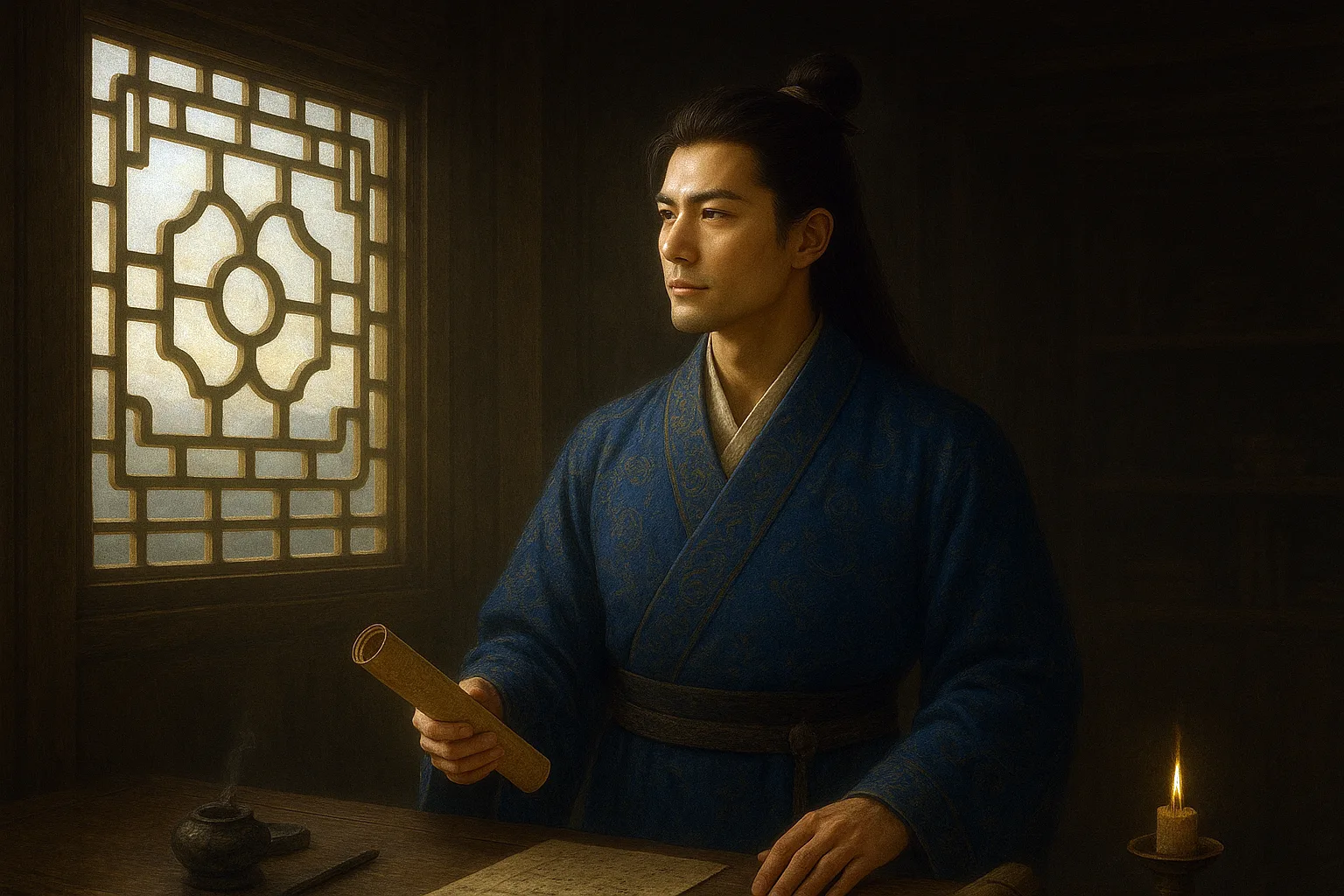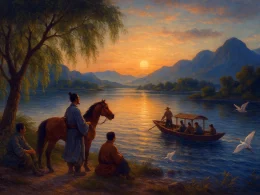We are told the Yellow Dragon Town
Has been besieged for years, not won.
The moon which shines on fair maidens at home
Is shared by warriors in the camp alone.
What does a young wife dream in spring?
What does her husband remember yesterday?
Who will lead our flags and drums arrayed
To take the Dragon City with his blade?
Original Poem
「杂诗三首 · 其三」
沈佺期
闻道黄龙戍,频年不解兵。
可怜闺里月,长在汉家营。
少妇今春意,良人昨夜情。
谁能将旗鼓,一为取龙城。
Interpretation
This poem was composed during the reign of Empress Wu Zetian. Though the empire was prosperous, border conflicts were frequent, with constant military campaigns at the Yellow Dragon Garrison (in present-day Nong'an, Jilin). Soldiers were stationed year-round without returning home, leading to family separations. As a court scholar, Shen Quanqi deeply felt the impact of endless warfare and the suffering of the people. Using the theme of "boudoir lament," he expressed war-weariness and a longing for peace. Though titled "Miscellaneous Poem," it is a poignant work of longing with strong anti-war sentiments, blending personal grief with the era's sorrow in a masterful display of artistic consciousness.
First Couplet: "闻道黄龙戍,频年不解兵。"
Wén dào Huánglóng shù, pín nián bù jiě bīng.
They say at the Yellow Dragon Garrison,
Year after year, arms are never laid down.
The poet opens with a plain, conversational tone. "They say" suggests casual discourse yet implies a sigh; "year after year, arms are never laid down" starkly reveals the cruelty and relentlessness of perpetual war. Without direct criticism, it conveys the people's hardship and the nation's exhaustion. The understated tone carries profound emotion, setting the poem's poignant mood from the start.
Second Couplet: "可怜闺里月,长在汉家营。"
Kělián guī lǐ yuè, cháng zài hàn jiā yíng.
Alas, the moon that shines on the boudoir,
Long lingers over the Han army's camp.
This couplet uses the moon as a link between the soldier and the pining woman. Instead of depicting people, the poet writes of the same moon lingering in two places, using spatial shift to imply emotional resonance. To the soldier, it is a moon of longing; to the boudoir dweller, a symbol of loneliness. "Alas" speaks volumes; "boudoir moon" and "Han camp" contrast stillness with movement, interior with wilderness, creating subtle imagery. Shen Quanqi uses the moon to convey emotion, making the poem ethereal and deeply evocative.
Third Couplet: "少妇今春意,良人昨夜情。"
Shàofù jīn chūn yì, liángrén zuóyè qíng.
The young wife's spring thoughts of today;
Her husband's tender feelings of last night.
These two lines form a precise antithesis with ingenious conception. "Spring thoughts of today" and "tender feelings of last night" mirror each other, blending spring and night, present and past, extending emotion through temporal disjunction. The wife's "spring thoughts" yearn for her husband; the husband's "tender feelings" remember his wife. Using parallelism, the poet shows the shared longing of the separated couple—just ten characters express their deep, melancholic love across distance.
Fourth Couplet: "谁能将旗鼓,一为取龙城。"
Shéi néng jiāng qígǔ, yī wèi qǔ Lóngchéng.
Who can raise the banners and drums,
Once and for all take the Dragon City?
The conclusion turns to lament. Elevating personal emotion to a collective wish, it voices the hopes of both the pining woman and the soldier, and the poet himself. The rhetorical question ends the poem—part plea, part helplessness—its cadence revealing profound sorrow. It echoes the opening's "arms are never laid down," creating a cohesive structure and a powerful closure.
Holistic Appreciation
The poem uses boudoir lament as a surface to convey anti-war sentiments beneath. Through the dual threads of "moon" and "emotion," it intertwines separation with war, encompassing the young wife's grief, the soldier's homesickness, and the poet's concern for endless conflict and people's suffering.
Artistically, the poet rejects the ornate style of palace poetry, using plain language to depict universal human emotions. "Spring thoughts of today" and "tender feelings of last night" form the emotional core, rich in musicality and rhythmic beauty, showcasing Shen Quanqi's pursuit of genuine feeling beyond strict formalism. The concluding question lingers in the reader's mind, conveying a powerless cry—not just the lament of a young wife, but the sigh of an entire troubled era.
Artistic Merits
- Profound Meaning in Small Details, Politics within Emotion: Uses boudoir lament to express anti-war sentiments, reflecting humanitarian concern.
- The Moon as a Medium, Dual Expression: Shared moonlight creates emotional resonance across time and space.
- Natural Language, Subtle Depth: Plain speech conveys sincere feeling without ornamentation.
- Symmetrical Structure, Harmonious Rhythm: The second and third couplets exhibit precise parallelism and fluid cadence.
- Thought-Provoking Ending, Shift in Mood and Scene: The rhetorical question leaves room for reflection, blending lament with introspection.
Insights
Through a woman's delicate emotions, the poet reflects the trauma of war in his time, using personal longing to capture the pain of human separation. This poem teaches us that true compassion stems not from grand rhetoric but from pity for individual lives. By contrasting the gentle "boudoir moon" with the weight of "banners and drums," Shen Quanqi reveals the deepest sorrow of war—it destroys not just cities but also emotions and hearts. With a tender touch, he addresses this profound theme, elevating this poem beyond narrow courtly praise to become one of the early Tang's most humanistic works.
About the Poet

Shen Quanqi (沈佺期 c. 656–715), courtesy name Yunqing, was a native of Neihuang in Henan Province and an important poet of the early Tang Dynasty. Along with Song Zhiwen, he was renowned as one of the "Shen-Song" duo, whose work played a decisive role in finalizing the form of the five-character regulated verse (wuyan lüshi) in Tang poetry. His poems often include courtly compositions and travel-themed reflections, characterized by refined elegance and structural rigor. Shen was particularly skilled in the seven-character regulated verse (qilü), and his writing marks a transition from the lingering style of the Six Dynasties to the flourishing era of High Tang poetry. His contributions hold milestone significance in the development of modern-style verse (jintishi).












